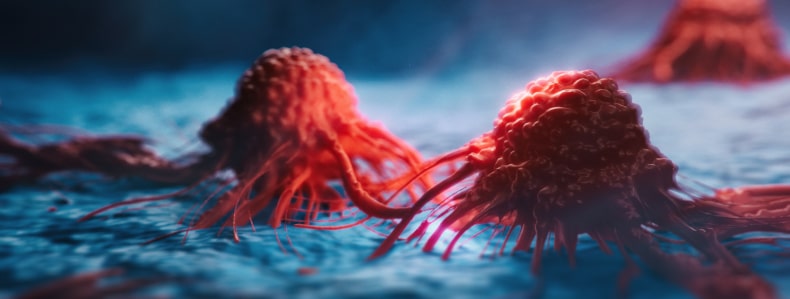Targeting Growth Factor Receptors in Cancer Research

The role of Growth Factor Receptors (GFRs) in both cancer initiation and treatment resistance is well known - meaning that therapeutics targeting GFRs are an attractive approach for today’s researchers.
GFRs play a key part in the growth and survival of cancer cells, as well as angiogenesis and metastasis. The overexpression of GFRs such as ErbB1/HER1 has been found to confer malignancy to various tissues, while mutations of epidermal growth factor receptors (EGFRs) are often found in cancers with poor prognosis. GFR amplification also causes resistance to many currently available treatments – including chemotherapies and targeted molecules – lending still more urgency to our search for a so-called ‘magic bullet’ to target cancer.
Amongst the most promising therapeutics that researchers are developing against cancer-causing GFRs are monoclonal antibodies (mAbs), protein kinase inhibitors, and nucleic acid-based gene silencers. A wide range of mAbs – including checkpoint inhibitors to block proteins that stop the immune system attacking cancer cells - have already been approved by the US Food and Drug Administration or are in clinical trials.
A significant proportion of pharmaceutical laboratories are also looking at the potential of protein kinase inhibitors, especially tyrosine kinase inhibitors (TKIs) that act like an ‘off’ switch to cells’ ability to divide and grow. Encouragingly, many TKIs have already demonstrated cytostatic effects in cancer cells and animal models, while combining them with chemo- or radio-therapeutic treatments could increase their efficiency further.
Nucleic acid-based therapeutics, meanwhile, offer a third promising way for researchers to target cancer-causing genes. Scientists have adapted the naturally occurring process of RNA interference (RNAi) – using short segments of synthetic double-stranded RNAs (dsRNAs) with the intention of ‘silencing’ the activity of cancer-causing genes. This approach – which typically employs a small hairpin RNA (shRNA) or a short interfering RNA (siRNA) to target and bind to messenger RNA sequences – is regarded as less toxic and potentially more effective than traditional therapeutics such as chemotherapy.
But for all their promise, there are still many puzzles to solve in the laboratory before we can regard any of mAbs, TKIs or RNAi as resembling that ‘magic bullet’. Each technique currently presents scientists with significant problems as well as benefits.
For example, primary or acquired resistance to GFR-targeted monoclonal antibodies has been identified as a major limitation on their clinical effectiveness. According to an article in the Journal of Cancer Metastasis and Treatment, “Patients treated with trastuzumab monotherapy showed intrinsic (66-88%) and acquired resistance within one year (15%).” Tyrosine kinase inhibitors used in therapeutic settings have also encountered several resistance mechanisms - including the overruling of the inhibitors’ function by the overexpression and amplification of GFR genes. Meanwhile, safe and effective targeting of GFRs with siRNA has also proven problematic - with delivery and pharmacokinetic issues, potential side effects, and the binding of dsRNAs to otherwise healthy genes all areas that require further work.
Each day, however, we are learning more about how to improve the promising treatments we have devised. We now know that TKIs with broad spectrum activity which inhibit several GFRs can often be more effective than highly specific inhibitors – for example, in preventing angiogenesis in pancreatic cancer cells. Moreover, broad spectrum TKIs can also be less prone to acquired resistance. Another important field of research is the genetic engineering of more effective nanosized carriers, including liposomes, intended to carry siRNAs rapidly into tumor cells and release them quickly into the cytoplasm.
From research to quality control standards, TRC has developed a series of products to support the cancer research community in the development and controls of Growth Factor Receptor target drugs.
We offer several anticancer, immunomodulatory and growth factor receptor target
products, along with checkpoint and cell cycle modulators (such as agonists, antagonists, enzyme inhibitors and related products).
Whether your laboratory is focused on monoclonal antibodies, protein kinase inhibitors, or nucleic acid-based therapeutics, we have all the tools needed for your cutting-edge research.
Search for related products using our comprehensive webshop and get in touch to learn more.
